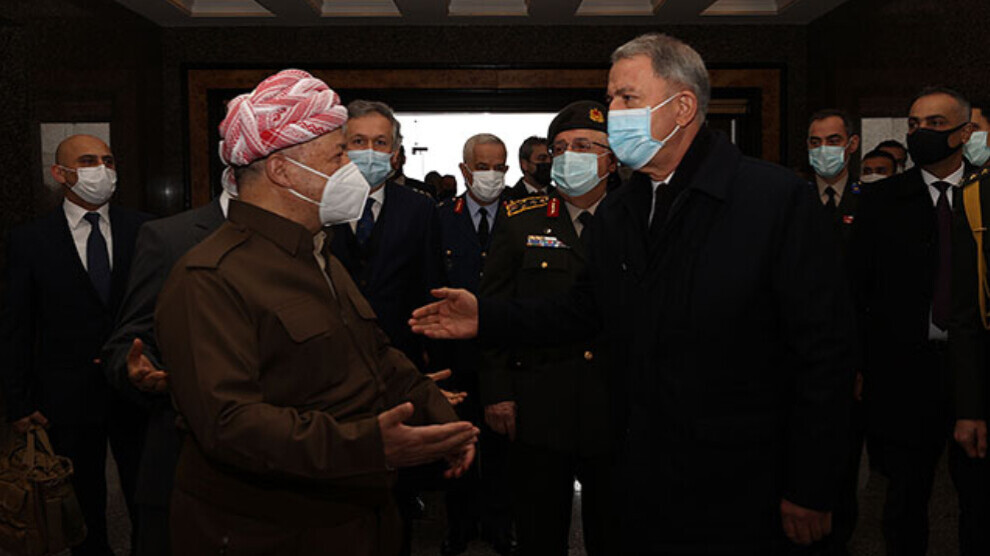Is Turkey testing the new US government?
All indications show that the Turkish state is ready to test whether the green light for the invasion of Dêrik and Shengal will be given at international level after the change of government in the US.
All indications show that the Turkish state is ready to test whether the green light for the invasion of Dêrik and Shengal will be given at international level after the change of government in the US.

Turkey is testing whether new invasions in Rojava and South Kurdistan would be tolerated. To this end, talks were held in Baghdad and Hewlêr and subsequently Moscow and Damascus.
Turkish Defense Minister Hulusi Akar and Chief of Staff Yaşar Guler visited Baghdad and Hewlêr. After talks with the Iraqi Prime Minister, Mustafa al-Kadhimi, in Baghdad and the Barzani in Hewlêr, Akar threatened to occupy Shengal. Turkish President Tayyip Erdogan spoke to journalists after Friday prayers. When asked whether an invasion of Shengal is on the agenda, he replied: "As I always say: We can arrive unexpectedly one night."
Iraqi Prime Minister al-Kadhimi said on Saturday that Turkey is ready to support Iraq with the five billion dollars promised at the Kuwait conference. For al-Kadhimi, five billion dollars would be a great gift in the election campaign, but he shouldn't forget that the Turkish state's coffers are empty.
In parallel to these developments, ANHA news agency reported, citing security circles, that Turkey is planning the simultaneous invasion of Shengal in South Kurdistan and Dêrik in Rojava within the next ten days.
A source from security circles in northern and eastern Syria told ANF that the Turkish state always intends to attack the region. He confirmed that there was information about preparations for an attack on Shengal and Dêrik.
A diplomatic source from northeast Syria said Turkey was carrying out intense diplomatic efforts at an international level and this could be related to its intention to attack. When asked about the possible dimensions of such an attack, the answer was: “It is too early to say that the conditions for an invasion like the one in Afrin, Serêkaniyê and Girê Spî are in place. However, attacks like the one on Qereçox in 2017 are possible."
The Turkish state has been switching and moving between the great powers, US and Russia, since 2016 in order to expand its zones of occupation. In 2018 it agreed with Russia on the occupation of Afrin and in 2019 with the US in the occupation of Girê Spî and Serêkaniyê. At the moment Turkey is testing whether this game can continue.
Before Biden took office in the US, the Turkish state knocked on Moscow's door to occupy Ain Issa. MIT chief Hakan Fidan visited Damascus for this purpose.
While the Turkish state continues the attacks on Ain Issa and Şehba, Damascus and Moscow are relying on provocations in Qamishlo and Hesekê carried out by the paramilitary association Difa al-Watani (Syria's National Defense Forces).
Şehba is still subject to an embargo by the Damascus government. At the same time, on Saturday, the Turkish state attacked Til Rifat and killed two children and a woman. The fact that the Difa al-Watani carried out its provocation in Qamishlo on the same day of the Til Rifat attack cannot be considered a coincidence.
The Turkish state is currently testing the viability of the Shengal Agreement, signed on 9 October between Baghdad and Hewlêr and coordinated by the Trump administration. Dêrik in Rojava is strategically located in the triangle between Syria, Turkey and Iraq. With the occupation of the region, the connection between Rojava and South Kurdistan will be severed. Turkey would also be one step closer to Shengal.
The new US government is being tested at the moment. A possible local attack is to find out how the US will react under Joe Biden. For Turkey, it is also a test of whether it will move on the Washington-Baghdad-Hewlêr axis or on the Moscow-Damascus axis in the future.